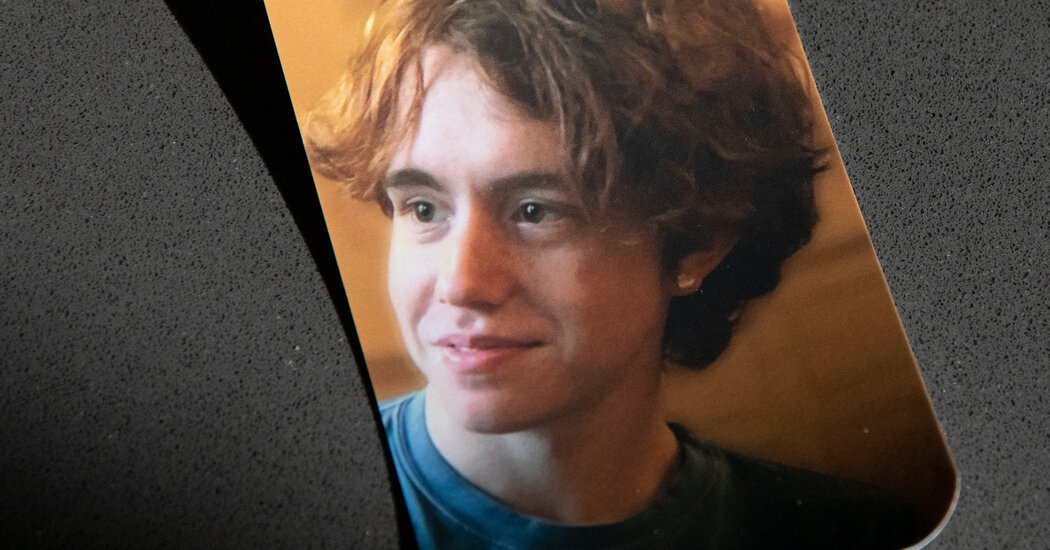It has been a year since Kathleen Kelley got the devastating call.
Her 17-year-old son, Nico, the youngest of her three children, had fallen six stories from the roof of their Manhattan apartment building and died.
Since then, she has pleaded with the police and Manhattan prosecutors for answers. She has asked her son’s friends and classmates at Fordham Preparatory School in the Bronx for any details about what happened on that rainy afternoon. And when an official investigation revealed scant information, she hired a private investigator.
To this day, Ms. Kelley, 58, has only one major clue about the final moments of her son, Nico Nuño-Kelley, who was supposed to start his first year at the University of Notre Dame last autumn. Minutes before he climbed to the roof of their Gramercy Park apartment in the driving rain on May 20, 2023, he inhaled marijuana from a friend’s vape pen and began acting erratically, according to statements the police and one of the two friends with him that afternoon gave to the private investigator.
The medical examiner’s office ruled Nico’s death an accident, but the uncertainty about what led to his fall has tormented his family. The friend who was said to have given him the vape pen has refused to talk to the police, to Ms. Kelley or to the investigator, and the police did not recover the pen.
A toxicology report, which relied on blood samples taken from Nico after his death, revealed high levels of THC — the chemical responsible for most of marijuana’s psychological effects — in his system. But the drug, according to specialists who have studied the effects of marijuana on the brain, rarely leads to the kind of reckless impulse that apparently led Nico to go up to the roof.
Ms. Kelley, a commodities adviser who owns her own company, said she fears she and her ex-husband, Hilario Nuño, Nico’s father, will never know the full truth about their son’s death.
Who sold the marijuana that Nico vaped? Was it tainted with something undetected by the toxicology report? How could there be no criminal consequences? And if the drug was not responsible for Nico’s unusual behavior, what else could explain it? Did he fall or jump?
Mr. Nuño, 59, said he and Ms. Kelley hope their son’s death sparks more conversations around the potency of marijuana, its accessibility and its potentially harmful effects on teenagers.
“That is the problem with this leniency, this lack of awareness of what’s going on with our youth,” he said. “We have to start being more careful because we’ve been given this freedom.”
The circumstances around Nico’s death, while extremely rare, according to specialists, are not unique. In Colorado, a 19-year-old man who consumed a cookie with high levels of THC died after jumping from a fourth-floor balcony, according to a 2015 report from the Centers for Disease Control and Prevention. In 2021, a 19-year-old Penn State student plunged 11 stories down a trash chute headfirst after she consumed alcohol and marijuana at a hotel. Police declined to charge the man who gave her the drugs.
A horrifying discovery
The day he died, Nico was at home with two friends — a girl he had known since childhood and her boyfriend, a fellow student from Fordham Prep.
Nico, who occasionally smoked marijuana, took a few puffs from the vape pen that the boyfriend gave him, according to a report compiled by the private investigator, which was based on interviews with the girl and Nico’s friends and text messages they sent one another that day. Outside, it was raining hard, but inside the apartment, Nico seemed relaxed.
Then suddenly he began acting strangely.
“No, I don’t like this,” he wailed. He paced the halls and grabbed the walls. He fell to the floor in the fetal position and whimpered, saying he felt “autistic,” according to the report.
He ran toward his room, and the two friends who were with him stayed in the kitchen.
Moments later, according to the report, the girl and her boyfriend heard loud ringing throughout the building. The roof alarm had gone off, and Nico’s room was empty. About 10 minutes later, a neighbor from the building next door rushed over to the lobby of Nico’s apartment building with horrifying news: A boy was lying unconscious on the roof of his building.
Nico was pronounced dead at Bellevue Hospital. The medical examiner’s office said the cause of death was multiple blunt impact injuries. The toxicology report did not find traces of any drugs other than marijuana in his system.
The police said that after consulting with the Manhattan district attorney’s office no charges would be filed.
“Our thorough investigation of this tragedy with the N.Y.P.D. revealed no evidence of criminality,” said Doug Cohen, a spokesman for the Manhattan district attorney’s office.
The parents of the girl and her boyfriend declined to comment, and The New York Times is not identifying the teenagers because they were underage at the time and have not been charged with any crimes.
A high dose of THC can cause severe panic and stress, said Dr. Michael Moss, the medical director of the Utah Poison Control Center at the University of Utah.
“We have lots of people who come to the emergency room or call us at the poison center when they have had too much cannabis,” he said. “They feel like they’re going to die when they’re actually quite fine. In most cases we have to settle them down and maybe give them a bit of a sedative.”
But a reaction that would cause someone to flee their apartment and climb stairs to a roof is “very unusual,” Dr. Moss said.
It is hard to know exactly how much THC was in Nico’s system at the time he fell because, unlike alcohol, THC levels in the blood rise and fall much more quickly, he said.
People with high levels of THC in their system may feel extreme paranoia, but that would typically cause them to stay still, not run into an open area in bad weather, said Dr. Benjamin Caplan, chief medical officer at the CED Clinic in Needham, Mass., which helps people seeking cannabis treatment.
“You wouldn’t feel steady enough on your feet to climb up stairs and climb outside or go near an edge because you’d be further terrified,” he said.
Dr. Caplan, who was not involved in Nico’s case, said it is possible that Nico had a “cannabis-associated psychotic episode,” a rare occurrence in which a person experiences hallucinations and delusions.
Young people with mental health conditions are more vulnerable to such episodes, but Nico had no history of mental illness, his mother said.
A call from the police
Among Nico’s friends, word of his death spread immediately. Nellie Fitzpatrick, 18, remembered getting a text that afternoon from their friend, Bobby Graves. The three had been friends since elementary school.
Now, Mr. Graves, 18, was at the apartment of the girl who had been with Nico, and he urged Ms. Fitzpatrick to come over.
The girl, sobbing, tried to explain what happened, but Ms. Fitzpatrick could barely understand her.
Ms. Kelley, Nico’s mother, was in Connecticut, driving to a friend’s house for dinner, when a police detective called her to say Nico had died in an accident.
“I thought it was some kind of scam,” she said. She demanded to speak to his supervisor and was dialing that number when her friend called. Ms. Kelley’s older son, Alejandro Nuño-Kelley, had been trying to reach her. He had also heard from detectives, who called him in Peru, where he had just landed that day for a vacation.
Where are you? Ms. Kelley’s friend asked.
At that moment, Ms. Kelley knew Nico was dead.
She got out of the car, walked through the pouring rain into the woods and lay in the mud.
A detective later asked if Nico could have deliberately killed himself. His family quickly rejected that possibility.
“Of all of us, Nico was the most open book,” his sister, Tara Nuño-Kelley, 24, said. “We would have known if Nico was struggling in any way.”
Nico was not impulsive and steered clear of other drugs, his friends said.
“He was so cautious,” Isabel Maida, 19, said. In New York, it is easy for teenagers with money to get drugs and alcohol, she said, but Nico had little interest in experimenting beyond marijuana.
“He was a fantastic student and definitely took his academics so seriously,” she said. “We both had aspirations to go to great colleges and do something great with our lives.”
Nico loved to read and could lose himself in a book for hours. He liked to play board games or go to Central Park with friends to sit in the grass and talk.
He would tell his friends to “stop being screenagers” if he caught them staring down at their phones for too long, Ms. Fitzpatrick recalled.
Nico was disappointed when he did not get into Princeton University, but he was far from depressed, his friends and family said.
He was excited about Notre Dame and had started contacting other prospective students in New York to organize a dinner, Mr. Graves said.
Ms. Kelley has retained a lawyer, Marc Stadtmauer, to try to build a legal case against whoever sold the vape pen that Nico used.
“What I’m trying to do is put the blame where it belongs — on the adults who made money off this tragic incident,” Mr. Stadtmauer said. But to do that, he said he needs more information or cooperation from the boyfriend who was at the apartment when Nico died.
The case was most likely challenging for prosecutors because marijuana is legal in the state, said Rebecca Roiphe, a professor at New York Law School and a former Manhattan prosecutor. The legal age to possess marijuana in New York is 21.
Though the teenagers were underage, the standard to charge for negligent homicide is high, Ms. Roiphe said. Prosecutors would need to show that the person who gave Nico the marijuana had behaved in some egregious way, like giving him a drug knowing it might kill him.
Even if a prosecutor could prove those elements, “is it right to bring charges against such a young kid who himself didn’t do anything that other kids aren’t doing all the time?” Ms. Roiphe said.
But prosecutors could have leaned harder on the boyfriend to find out who sold the drug, Ms. Roiphe said.
The district attorney’s office declined to comment on the specifics of the case.
A lock of hair, a funny hat
Nico’s family members have tried to comfort themselves with small mementos. His mother wears a locket around her neck that holds a lock of Nico’s hair.
Alejandro, 26, had bought his brother a quirky blue and white hat made from alpaca fur at the airport just after he landed in Peru. .
“My brother did not conform to a dress code,” Alejandro said. Nico often wore odd and mismatched clothing, usually over his family’s objections. “If I made fun of him hoping he would change, he would keep it on even longer,” he said.
After Nico’s death, he gave the hat to his father, who wore it all winter.
“I wear all of Nico’s stuff,” Mr. Nuño said. “I wear his sweaters. It’s not my style, but it was his.”
Tara, Nico’s sister, said she thinks spiritually about the tragedy.
“I do think sometimes we were meant to have the life we had with Nico,” she said. “I think less about the moment of death and more about what a gift he was while he was here.”
His mother thinks often about one of her last days with Nico. Two weeks before he died, she was supposed to go to lunch with friends in Bedford, N.Y. He begged to come along, and she hesitated.
Sometimes moms like to be with their friends, too, she recalled telling him. But she gave in. After lunch, they spent the day walking through the town, with Nico pausing at real estate offices and fantasizing about buying a house when he was older, Ms. Kelley said.
Every time they visited a new town, she said, he scoured the real estate listings, then announced confidently: “This is where I’m going to live when I grow up.”















